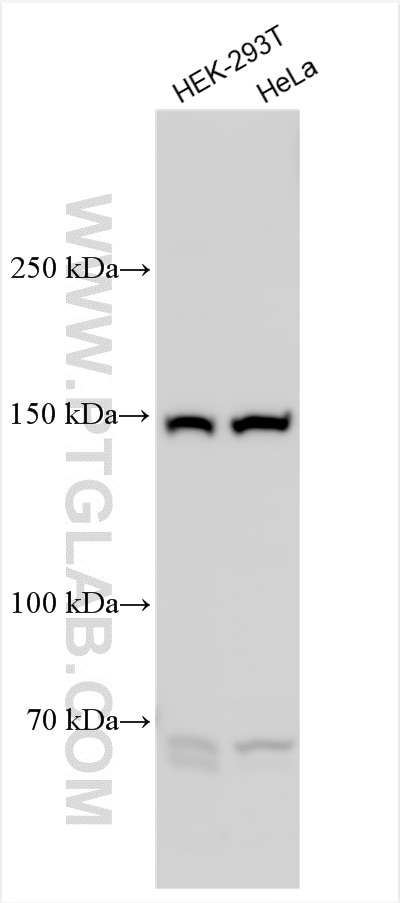Validation Data Gallery
Tested Applications
| Positive WB detected in | HEK-293T cells, HeLa cells |
Recommended dilution
| Application | Dilution |
|---|---|
| Western Blot (WB) | WB : 1:500-1:2000 |
| It is recommended that this reagent should be titrated in each testing system to obtain optimal results. | |
| Sample-dependent, Check data in validation data gallery. | |
Product Information
31846-1-AP targets GPR158 in WB, ELISA applications and shows reactivity with human samples.
| Tested Reactivity | human |
| Host / Isotype | Rabbit / IgG |
| Class | Polyclonal |
| Type | Antibody |
| Immunogen | GPR158 fusion protein Ag34602 相同性解析による交差性が予測される生物種 |
| Full Name | G protein-coupled receptor 158 |
| Calculated molecular weight | 135 kDa |
| Observed molecular weight | 150 kDa |
| GenBank accession number | BC157124 |
| Gene Symbol | GPR158 |
| Gene ID (NCBI) | 57512 |
| RRID | AB_3670127 |
| Conjugate | Unconjugated |
| Form | Liquid |
| Purification Method | Antigen affinity Purification |
| UNIPROT ID | Q5T848 |
| Storage Buffer | PBS with 0.02% sodium azide and 50% glycerol , pH 7.3 |
| Storage Conditions | Store at -20°C. Stable for one year after shipment. Aliquoting is unnecessary for -20oC storage. |
Background Information
G protein-coupled receptors (GPCR) are the largest family of proteins encoded in mammalian genomes that detect extracellular signals to program cellular response, which are essential to understanding physiology, disease, and drug development (PMID: 29249361; 29298813). G protein-coupled receptor 158 (GPR158, also known as mGlyR) is a class C orphan GPCR prominently expressed in brain tissue, where it controls synapse formation and function (PMID: 22689652; 34793198). It can transduce signals by coupling to the regulator of protein signaling (RGS) proteins and be related to the development of major depressive disorder and prostate cancer (PMID: 36996198; 29419376; 25693195).
Protocols
| Product Specific Protocols | |
|---|---|
| WB protocol for GPR158 antibody 31846-1-AP | Download protocol |
| Standard Protocols | |
|---|---|
| Click here to view our Standard Protocols |
